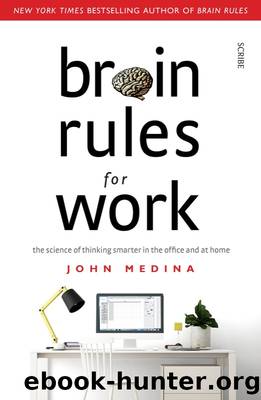Brain Rules for Work by Medina John;

Author:Medina, John;
Language: eng
Format: epub
Tags: SCI086000, BUS042000, BUS097000, BUS041000, BUS096000, PSY051000, PSY021000, BUS038000, SEL044000
Publisher: Scribe Publications
Published: 2021-10-18T16:00:00+00:00
power
Brain Rule:
Power is like fire. It can cook your food or burn your house down.
POWER DOES FUNNY THINGS to people, though it might be just as accurate to say power also reveals funny things about people.
Take the 1970s Ugandan dictator Idi Amin. His reign was notorious for its corruption, eccentricity, and brutality. He more than earned his nickname: the Butcher of Uganda. Amin was murderous (he killed hundreds of thousands), extremely sexually active (he went through six wives and may have fathered up to fifty-four children), and possessed such ribald behavioral quirks that Saturday Night Live satirized him no less than four times. He created the following official title, to be read whenever his presence was announced:
His Excellency, President for Life, Field Marshal Al Hadji Doctor Idi Amin Dada, VC, DSO, MC, CBE, Lord of All the Beasts of the Earth and Fishes of the Seas and Conqueror of the British Empire in Africa in General and Uganda in Particular.
He also claimed he was King of Scotland.
The effects of power on people have been depicted in fictional narratives from King Lear to Citizen Kane to more recent lighthearted fare like the TV show The Office. One episode of the show, entitled âThe Coup,â features the character Dwight Schruteâa power-lusting wannabe executive played by Rainn Wilsonâchristening himself Assistant Regional Manager as he guns for the position of his actual Regional Manager, Michael. Dwight plots with his office-crush, Angela, to take control, but Michael discovers this takeover scheme and decides to employ a ruse. He tells Dwight heâs stepping down, handing him the levers of power. Dwight soon makes a wreck of things, planning the firing of employees left and right and scheming with a colleague about future managerial conquests. People, naturally, are shocked. Michael reveals the ruse, relieving Dwight of his responsibilitiesâand his plans. Itâs obvious these tendencies were always resident in Dwight, but when he obtained power, they came out at full throttle, revealing who he wasâmaybe even, given enough time, changing who he was.
Though Amin and Schrute come from completely different narratives, only the last story is fictional, and just barely. What Amin and Schrute have in common is a preoccupation with themselves and their power, a tendency to ignore the welfare of people theyâre leading, and a power-suffused sexual appetite. Their stories are emblematic of the vulnerabilities to which virtually anyone can fall prey when they acquire power.
How do we explain this bad behavior? Why do some leaders rise to the occasion while others declare themselves Lord of All the Beasts? What is it about power that can turn people into monstersâor perhaps, more accurately, reveal the monsters resident in them all along? And what can we do to prevent power from going to our heads if we acquire it?
We can address those issues after we define a few terms, beginning with the word power. The definition we use comes from psychologist Dacher Keltner, a researcher who has studied the effects of power for years:
In psychological science, power
Download
This site does not store any files on its server. We only index and link to content provided by other sites. Please contact the content providers to delete copyright contents if any and email us, we'll remove relevant links or contents immediately.
Should I Stay or Should I Go? by Ramani Durvasula(6785)
Why We Sleep: Unlocking the Power of Sleep and Dreams by Matthew Walker(5642)
Fear by Osho(4085)
Flow by Mihaly Csikszentmihalyi(4052)
Rising Strong by Brene Brown(3781)
Why We Sleep by Matthew Walker(3773)
Too Much and Not the Mood by Durga Chew-Bose(3694)
How to Change Your Mind by Michael Pollan(3679)
The Hacking of the American Mind by Robert H. Lustig(3580)
Lost Connections by Johann Hari(3455)
He's Just Not That Into You by Greg Behrendt & Liz Tuccillo(3303)
Evolve Your Brain by Joe Dispenza(3051)
What If This Were Enough? by Heather Havrilesky(2945)
Resisting Happiness by Matthew Kelly(2887)
Crazy Is My Superpower by A.J. Mendez Brooks(2860)
The Courage to Be Disliked by Ichiro Kishimi & Fumitake Koga(2797)
The Book of Human Emotions by Tiffany Watt Smith(2771)
Descartes' Error by Antonio Damasio(2731)
In Cold Blood by Truman Capote(2685)
